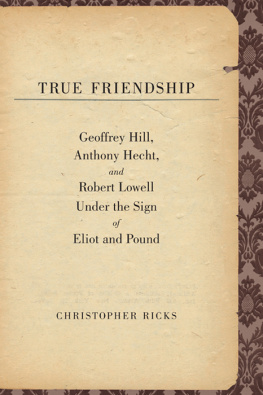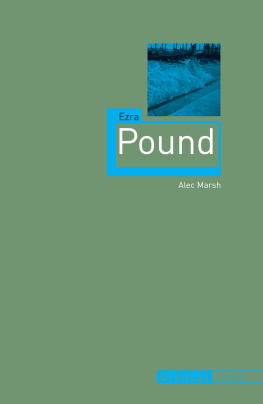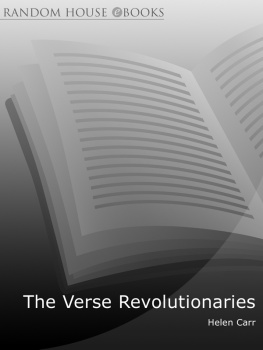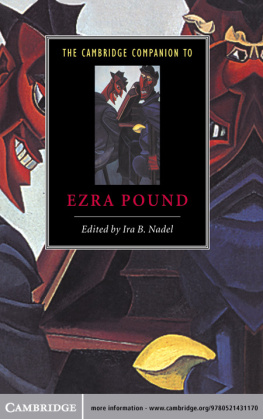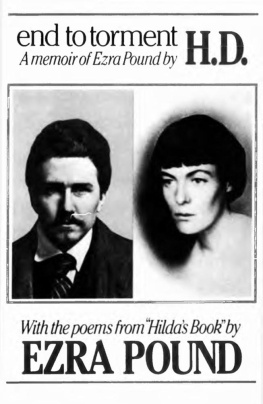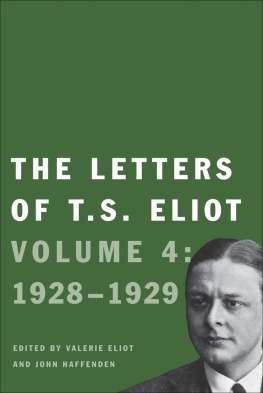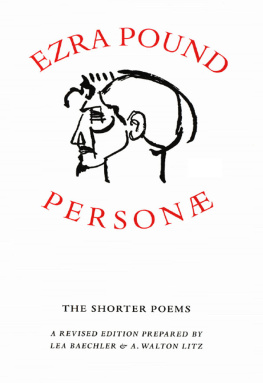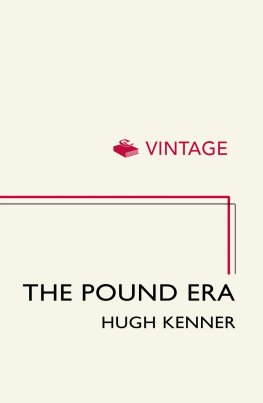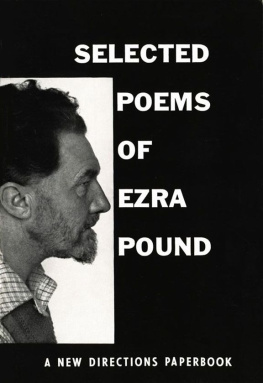The
Anthony Hecht Lectures
in the Humanities
TRUE FRIENDSHIP
Geoffrey Hill, Anthony Hecht, and Robert Lowell
Under the Sign of Eliot and Pound
Christopher Ricks
Yale University Press New Haven & London
This book was first presented as the Anthony Hecht Lectures
in the Humanities given by Christopher Ricks at Bard College in 2007.
The lectures have been revised for publication.
Copyright 2010 by Christopher Ricks.
All rights reserved.
This book may not be reproduced, in whole
or in part, including illustrations, in any form (beyond
that copying permitted by Sections 107 and 108 of the U.S.
Copyright Law and except by reviewers for the public press),
without written permission from the publishers.
Designed by Lindsey Joy Voskowsky.
Set in Bembo type by Tseng Information Systems, Inc.
Printed in the United States of America.
Library of Congress Cataloging-in-Publication Data
Ricks, Christopher B.
True friendship : Geoffrey Hill, Anthony Hecht, and Robert Lowell
under the sign of Eliot and Pound / Christopher Ricks.
p. cm. (The Anthony Hecht lectures in the humanities)
This book was first presented as the Anthony Hecht Lectures in
the Humanities given by Christopher Ricks at Bard College in 2007.
The lectures have been revised for publication.
Includes bibliographical references and index.
ISBN 978-0-300-13429-2 (alk. paper)
1. Hill, GeoffreyFriends and associates. 2. Hecht, Anthony, 1923-2004
Friends and associates. 3. Lowell, Robert, 1917-1977 Friends and associates.
4. Eliot, T. S. (Thomas Stearns), 1888-1965 Influence. 5. Pound, Ezra,
1885-1972 Influence. 6. American poetry20th centuryHistory and
criticism. 7. English poetry20th centuryHistory and criticism. I. Title.
PR6015.14735Z844 2010
821.9109 dc22
[B]
2009019207
A catalogue record for this book is available from the British Library.
This paper meets the requirements of ANSI/NISO Z39.48-1992 (P ERMANENCE O F P APER ).
10 9 8 7 6 5 4 3 2 1
The Anthony Hecht Lectures in the Humanities,
given biennially at Bard College, were established to
honor the memory of this preeminent American poet by
reflecting his lifelong interest in literature, music, the visual arts,
and cultural history. Through his poems, scholarship, and teaching,
Anthony Hecht has become recognized as one of the moral voices
of his generation, and his works have had a profound effect
on contemporary American poetry. The books in this
series will keep alive the spirit of his work and life.
Contents
Prefatory Note
1 Geoffrey Hill
2 Anthony Hecht
3 Robert Lowell
Notes
Credits
Prefatory Note
Geoffrey Hill, Anthony Hecht, and Robert Lowell under the sign of Eliot and Pound: the figure of speech comes from T. S. Eliot, who used it in a letter of 18 October 1939 to the scholar Edward J. H. Greene. Of the poems in Prufrock and Other Observations, only four (Eliot said) place themselves sous le signe de Laforgue, under the sign of Laforgue.
Here are five poets who mean a great deal to the world, to me, and this being the claim of True Friendship to one another. (Though not quite, I grant at once, to every single one of the others.) That Eliot and Pound were as fecundating for each other as had been Wordsworth and Coleridge this is not news, although in this setting there may be a few new things to notice about it. Eliot and Pound cared diversely about Lowell and his art. Lowells poems and criticism engage in turn, albeit very differently, with Pound and Eliot. Hills poems as well as his criticism wrestle angelically with Eliot, with Pound, and with Lowell. Finally, Hechts criticism and poems undertake their fervent discriminations in apprehending Eliot and Pound, calling Eliot to account and calling Pounds bluff. There is nothing by Pound, so far as I know, that touches upon Hecht or Hill, but there remains only the one two-sided vacancy that is of any moment: that Hill and Hecht, despite the shared respects in which they comprehend their art and its common but far from commonplace concerns, never really met. Which may provide the ground against which the other related figures can be seen.
Something may briefly be said here about my meetings, in person and in pages, with the poets. I never met Pound, and although I shall never forget the exuberated astonishment with which in 1951 I fell upon The Selected Letters of Ezra Pound, 1907-1941, I believe that I have never noticed anything about his poems that others have not well noticed already. The most that I have been able to do is express both a precipitated gratitude and some provoked reservations about Donald Davies two unignorable books on Pound. Eliot, I never met either, and this is scarcely the place to go into the story of his threatening to sue me, but I like to think that in my two books on his art, T. S. Eliot and Prejudice (1988) and Decisions and Revisions in T. S. Eliot (2003), there was some meeting of minds, mine being the immensely smaller one. Editing Eliots early unreleased poems, published in 1996 as Inventions of the March Hare: Poems, 1909-1917, brought home to me, and not only to me fortunately, the ways in which Eliots genius had been there from the first and had always grown, in him and then within us. To edit his complete poems in a critical edition now, as I am doing with Jim McCue, is a privilege beyond price and (chasteningly but not as yet cripplingly) beyond any two persons means.
Personal friendship with Geoffrey Hill, with Anthony Hecht, and with Robert Lowell has been, over the past thirty to fifty years, a more than momentary stay against confusion, and I imagine that it must have gone to the making of the claims in this book, or must at least have gone to the wish to make them. But it doesnt seem to me that my arguments and appreciations, as appreciative argument, derive from or depend upon personal friendship or personal feelings. I have published for more than forty years my gratitude for Hills art and for Lowells, and for thirty years my gratitude for Hechts. It would please me if, after all these years and all that is owed to these poets, the five of them were to form for others as well as for me the mysteriously persuasive shaping that Sir Thomas Browne delighted in: the quincunx. But I should of course settle for something along less far-fetched lines, such as the dear, down-to-earth way of putting it that William Empson came up with: the right handle to take hold of the bundle. Or rather, merely a right handle to take hold of the bundle.
The invitation to give the Anthony Hecht Lectures in the Humanities in 2007 came as a surprise, a boon, and a blessing; I am very grateful to Helen Hecht, to J. D. McClatchy, and to Bard College and its president, Leon Botstein; this, together with thanks to the good offices of Debra Pemstein.
Jonathan Post is editing the letters of Anthony Hecht, with the support of Helen Hecht; I am grateful that so many pertinent letters have been made available to me. Jim McCue, Lisa Nemrow, Lisa Rodensky, Rosanna Warren, and Jon Westling kindly read various chapters and gave me good advice.
To Yale University Press, I am grateful too. Entirely so, as to Jennifer Banks, Susan Laity, and Christina Tucker. To the Press itself, all but entirely grateful, the withheld 1 percent being a matter of the Presss not permitting footnotes. I have taken up into the body of the text some material which would otherwise have had to be in endnotes and therefore not sufficiently in the immediate vicinity of the passages to which the matter within the notes was ancillary and comparative. The reader is therefore informed that the endnotes consist only of page references and the like, except on the few occasions on which I specifically draw attention to an endnote of a more substantive kind. When quoted poetry is run within the sentence, the final punctuation has sometimes been changed to accord with the syntactical needs. When a block excerpt is given, however, the end punctuation exactly matches the poem, regardless of syntax. Although this may occasionally look awkward, it does not mislead as to cadence and syntax.
Next page
